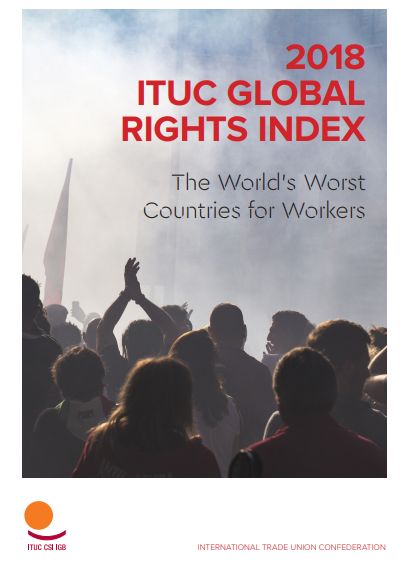The 2018 ITUC Global Rights Index depicts the world’s worst countries for workers by rating 142 countries on a scale from 1-5 based on the degree of respect for workers’ rights with 1 being the best rating and 5 the worst rating. Violations are recorded each year from April to March. Each country is analysed against a list of 97 indicators derived from ILO conventions and jurisprudence and represents violations of workers’ rights in law and practice.
“Democracy is under attack in countries that fail to guarantee people’s right to organise, speak out and take action. Brazil passed laws that denied freedom of association, China restricted free speech and the military was used to suppress labour disputes in Indonesia,” said Sharan Burrow, General Secretary, International Trade Union Confederation (ITUC).
More countries are excluding workers from labour law – from migrant workers, public sector employees to workers in platform businesses, with 65% of countries excluding whole categories of workers from labour law.
“Decent work and democratic rights grew weaker in almost all countries, while inequality continued to grow. This was fuelled by the outrageous behaviour of many multinational companies, such as Samsung whose anti-union practices deny workers freedom of association and collective bargaining rights, as shown in internal company documents seized from their offices in Korea. And the corporate power of Amazon continues to grow unchecked, from treating workers like robots to threatening to halt its expansion in Seattle over tax proposals to create affordable housing,” said Burrow.
The report’s key findings include:
- 65% of countries exclude some groups of workers from labour law.
- 87% of countries have violated the right to strike.
- 81% of countries deny some or all workers collective bargaining.
- Out of 142 countries surveyed, 54 deny or constrain free speech and freedom of assembly.
- The number of countries in which workers are exposed to physical violence and threats increased by 10% (from 59 to 65) and include Bahrain, Honduras, Italy and Pakistan.
- Countries where workers are arrested and detained increased from 44 in 2017 to 59 in 2018.
- Trade unionists were murdered in nine countries – Brazil, China, Colombia, Guatemala, Guinea, Mexico, Niger, Nigeria and Tanzania.
The report ranks the ten worst countries for workers’ rights in 2018 as Algeria, Bangladesh, Cambodia, Colombia, Egypt, Guatemala, Kazakhstan, the Philippines, Saudi Arabia and Turkey.
Haiti, Kenya, Macedonia, Mauritania and Spain have all seen their rankings worsen in 2018 with a rise in attacks on workers’ rights in law and practice.
About the ITUC
The International Trade Union Confederation (ITUC) is a confederation of national trade union centres, each of which links trade unions of that particular country. It was established on 1 November 2006, bringing together the organisations which were formerly affiliated to the ICFTU and WCL (both now dissolved) as well as a number of national trade union centres which had no international affiliation at the time. The Confederation has 331 affiliated organisation in 163 countries and territories on all five continents, with a membership of 207 million, 40 per cent of whom are women. It is also a partner in “Global Unions” together with the Trade Union Advisory Committee to the OECD and the Global Union Federations (GUFs) which link together national unions from a particular trade or industry at international level. The ITUC has specialised offices in a number of countries around the world, and has General Consultative Status with the Economic and Social Council of the United Nations.

